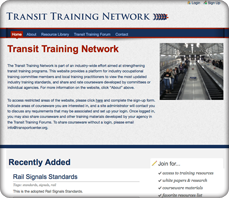News
Our Friend and Colleague, Robin Gillespie
Posted February 2021

We are saddened to report the passing last week of our colleague and friend, Robin Mary Gillespie. Robin was appreciated by many as the transit industry’s foremost expert on occupational health and safety for frontline workers. She was completely dedicated to helping transit workers overcome the many risks to their safety and healthy traditionally built into their work environments. For the past decade she worked (full and part time) as the Transportation Learning Center’s Director for Health and Safety.
Robin was extremely well educated – with a PhD in Environmental Health Sciences and a master’s degree in Public Health Education. But what set her apart was her incredible hard work and devotion to make sure that our jobs would not cripple, sicken or kill workers.
She did extensive program development work with transit unions and with joint programs of transit employers and unions. She worked on upgrading safety and health practices and training and education programs at New York City Transit with TWU Local 100 and NY MTA. She worked closely with ATU International and TWU on projects to make bus design safer and healthier for operators and for the public.
Nationally, Robin led research and education projects at the National Science Foundation’s Transportation Research Board and its Transit Cooperative Research Program (TCRP). Dr. Gillespie was the lead author of the groundbreaking 2016 TCRP report, Bus Operator Workstation Design for Improving Occupational Health and Safety, and the principal investigator on the TCRP Project on Improving Transit Bus Operator Health, Wellness, and Retention . She also worked on TCRP A-35 Improving Safety Culture in Public Transportation .
An important part of her work was as a university-affiliated author and researcher at Hunter College in New York and the Mount Sinai Hospital Selikoff Center for Occupational/Environmental Medicine. In addition to her work in transportation, she also did occupational health and safety work for the Service Employees International Union and the National Union of Hospital and Health Care Employees (1199). Through her array of associations and connections in academia, labor and industry, she produced dozens of publications and formal presentations on health, safety, ergonomics and helping people improve the health environment of their work places.
Center Deputy Director, Xinge Wang, shares her personal memories of Robin: “Robin distinguished herself with her relentless drive for perfection and the highest level of work ethic I have ever witnessed. She never let a report out of her computer without triple checking the work. Even during the time when she suffered most physically, she never missed a meeting. In many of the video calls we made to complete TCRP Project F-17 , a reminder for her to take a break used to pop up regularly on her screen (she set those reminders following her own advice to others as a trained health professional). She was usually so immersed in the work that she kept on disabling them and complaining about their interrupting her work. Robin was caring and personable. She loved chatting about our kids after project meetings. She would enthusiastically share all the tips from raising her daughter, though still worrying about her as she entered adulthood. Robin was a dear colleague and friend and I have learned so much from her.”
Through her dedication, Robin made many important contributions to improving the lives of working people. We will all miss her.
